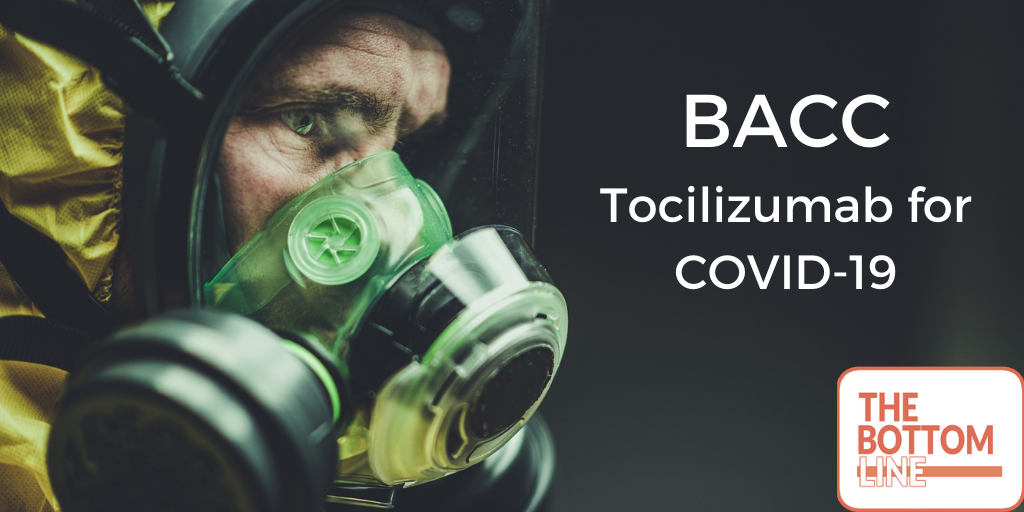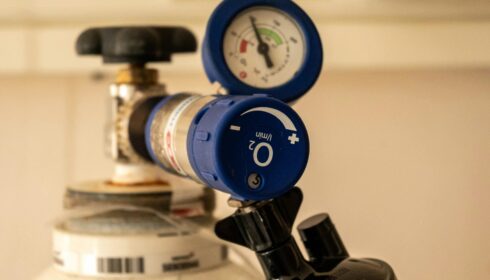BACC

Efficacy of Tocilizumab in Patients Hospitalized with COVID-19
Stone JH, for the BACC Bay Tocilizumab Trial Investigators. N Engl J Med 2020;383:2333-44. DOI: 10.1056/NEJMoa2028836
Clinical Question
- In hospitalised patients with severe acute respiratory syndrome due to coronavirus 2 (SAR-CoV-2), does tocilizumab compared with placebo, reduce intubation rates or mortality?
Background
- In December 2019 the Wuhan province in China became the epicentre of a devastating, highly contagious viral infection, SARS-CoV-2, a novel coronavirus that causes COVID-19 illness
- By March 2020, the World Health Organisation announced they were deeply concerned by the alarming levels of spread and severity of the disease and characterised COVID-19 as a pandemic
- To date, there are more than 74 million confirmed COVID-19 cases worldwide and 1.6 million deaths
- There have been many trials conducted on patients with COVID-19, with the hope to find effective therapeutic options. To date, the treatments that have shown effectiveness are Dexamethasone, which reduces 28-day mortality and Remdesivir, which may reduce hospital length of stay.
- Early observation in Chinese patients showed an association between high circulating levels of the pro-inflammatory cytokine IL-6 and progression to death and mechanical ventilation. Tocilizumab is an IL-6 receptor blocker
- A retrospective, observational trial, STOP-COVID suggested a benefit to using tocilizumab, HR 0.71 for time to death. Several RCTs have not demonstrated a mortality benefit in patients receiving tocilizumab (EMPACTA, COVACTA, CORIMUNO-TOCI-1, RCT-TCZ-COVID-19)
Design
- Randomised controlled trial
- 2:1 randomisation to tocilizumab or placebo
- Double-blinded
- Random block size of 3 or 6
- Stratification by site
- Informed consent was obtained
- With 243 patients the trial had a power of 80% to detect a reduction of death or the need for invasive mechanical ventilation from 30% to 15%
- Modified intention to treat analysis – included all patients that were randomised and received either tocilizumab or placebo before intubation or death
Setting
- 7 hospitals in Boston, MA, USA (Investigator initiated Boston Area COVID-19 Consortium: BACC)
- The trial was funded by Genetech, who provided tocilizumab but had no role in the design or data analysis
- Patients were enrolled between April 20 and June 15 2020: total number enrolled was 243 (161 received tocilizumab and 81 placebo)
Population
- Inclusion: Age 19-85 AND confirmed SARS-CoV-2 AND 2 of: fever (>38C), pulmonary infiltrate, need for supplemental O2 to keep SaO2>92% AND 1 of CRP>50mg/L, Ferritin >500ng/ml, d-dimer>1000ng/ml or LDH > 250u/L
- Exclusion: supplemental O2 >10L/min, recent treatment with biologic agents or immunosuppressive therapy, diverticulitis
- Patients were well matched at baseline, except age > 65 years
- Comparing tocilizumab vs placebo groups
- Age >65 years: 37% vs. 27%
- Nursed in non-intensive care ward and
- not on oxygen: 14% vs. 18%
- on oxygen: 83% vs. 74%
- Receiving non-invasive ventilation of highflow oxygen: 3% vs. 6%
- Mechanically ventilated: 0% vs. 1%
- Received glucocorticoids: 11% vs. 6%
- Comparing tocilizumab vs placebo groups
Intervention
- Tocilizumab
- A single dose of tocilizumab, 8mg/kg (not exceeding 800mg) and usual care
Control
- Placebo
Management common to both groups
- The trial was conducted after release of ACTT-1 trial, so some patients received remdesivir
- The trial was conducted before the release of RECOVERY-dexamethasone, so no patients received dexamethasone
Outcome
- Primary outcome: Hazard Ratio for intubation or death (time to event analysis) – no significant difference
- Tocilizumab vs Placebo: HR 0.83 (95%CI 0.38-1.81) p=0.64
- Rates of intubation or death by day 28: 10.6% vs. 12.5%
- Tocilizumab vs Placebo: HR 0.83 (95%CI 0.38-1.81) p=0.64
- Secondary outcomes:
- Comparing tocilizumab vs. placebo – no significant differences in
- Clinical worsening at day 28
- HR 1.11 (95%CI 0.59-2.10) p=0.73
- Clinical improvement at Day 28 with discontinuation of supplemental O2
- HR 0.94 (95%CI 0.67-1.3) p=0.69
- Mortality at day 28
- 5.6% vs. 3.8%, HR 1.52 (95% C.I. 0.41-5.61)
- Clinical worsening at day 28
- Comparing tocilizumab vs. placebo – no significant differences in
- Safety:
- Neutopenia more common in the Tocilizumab group (13.7% vs 1.2%)
- Serious secondary infection more common in the placebo group (8.1% vs 17.1%)
Authors’ Conclusions
- In this randomized, double-blind, placebo-controlled trial, we did not find any efficacy of IL-6 receptor blockade for the treatment of hospitalized patients with COVID-19
Strengths
- Randomized, double-blinded
- Allocation concealment
- Complete follow-up
- Ethnic diversity improves external validity
Weaknesses
- Modified intention to treat analysis (although only 1 patient didn’t get analysed in the group they were allocated to and were included in the safety data
- A small study that does not exclude benefit in all subgroups of patients with COVID-19 acute respiratory syndrome, eg severe COVID-19 pneumonitis
- The primary event rate was much lower than the anticipated 30%. Despite this, there was still no signal to benefit for tocilizumab
- The patients were not an ICU cohort at randomisation
The Bottom Line
- The results of this small randomised trial are consistent with results of other small randomised trials of tocilizumab in patients with acute respiratory failure from SARS-CoV-2, that is, there is no benefit demonstrated
- However, the patients in this trial were only moderately unwell and the wide confidence intervals do not exclude a treatment benefit in some patient groups, eg those with severe COVID-19 pneumonitis
- I hold my judgement at this stage as to whether this trial’s results can be applied to ICU patients with severe COVID-19
External Links
- [article] Efficacy of Tocilizumab in Patients Hospitalized with COVID-19
- [further reading] BMJ: Covid-19: Critically ill patients treated with arthritis drug tocilizumab show improved outcomes, researchers report
Metadata
Summary author: Celia Bradford @celiabradford
Summary date: December 16 2020
Peer-review editor: @davidslessor
Image by Elliot Alderson from Pixabay



